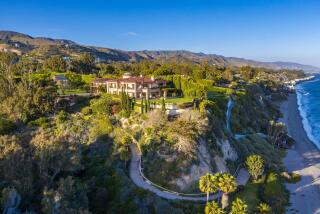Towering Losses : Japan’s U.S. Real Estate Buying Binge Is Now Bust
- Share via
Burned by recession and falling property values on both sides of the Pacific, Japanese investors are hoping to sell or lower the debt on as much as 40% of the U.S. office towers and other real estate they have bought over the last nine years, a survey by a respected accounting and consulting firm shows.
In a dramatic sign that big foreign buyers no longer see owning U.S. properties as a sure-fire way to make money, the report by Los Angeles-based Kenneth Leventhal & Co. said that Japanese investors put only $705 million into American real estate last year--a mere 4% of the $16.54 billion they invested at the peak of their buying binge in 1988.
Nearly all of that money went to finish projects they had begun years ago, primarily hotel ventures in Hawaii, said Leventhal’s Jack Rodman, who directed the annual survey.
For the first time since Leventhal began publishing the study in 1986, sales, foreclosures and loan restructurings by Tokyo-based companies surpassed the amount of their brand-new investments in the United States.
In a sense, the survey’s findings mark the official end of a nearly decade-long buying spree in which Japanese investors purchased some of America’s most treasured properties, including Rockefeller Center in New York and the Pebble Beach golf course in Northern California.
Many of those deals have soured. Pebble Beach was resold at an estimated $340-million loss in 1992, and Rockefeller Center now is worth less than the Japanese owe on it.
The problems these troubled investors now face are rocking boardrooms in Tokyo, Rodman said. But they are also having a broad--if subtle--impact on the lives of many people in California, where about a third of Japan’s U.S. holdings are located.
When the Japanese were building new projects and buying prized U.S. properties--such as the jet-black, twin towers of Arco Plaza in Downtown Los Angeles--back in the 1980s, they helped to fuel a development boom that provided literally thousands of high-paying jobs, ranging from construction work to office management.
The buying spree also pushed property values here higher, providing local governments with millions of dollars in sorely needed property tax revenue to pay for police, schools and a variety of other public services.
The Japanese began to throttle back on their U.S. investments in 1990, shortly after their own stock market crashed and recession tightened its hold on the economies of both America and Japan.
Now attempts by Japanese investors to sell or renegotiate the loans on 40% of their U.S. holdings--valued at about $77 billion--could deal a serious blow to Southern California’s battered real estate market, which only recently began showing solid signs of improvement.
The long decline in values for office buildings and most other types of commercial property finally leveled off last year and demand rose, raising many analysts’ hopes that a pickup in construction activity could come by the end of this year.
“But if the Japanese panic and dump all their properties on the market at once, everybody’s property values will head south again, and it will delay a recovery in commercial construction right here in California,” said Sanford Goodkin, a veteran real estate consultant from San Diego who works with big investors from both Tokyo and the United States.
Some investors from Tokyo have already moved to cut their losses from investments in Southern California.
Earlier this year, Dai-Ichi Semei America Corp.--a U.S. affiliate of a big Japanese insurance company--sold its half-interest in the 42-story AT&T; Center in Downtown Los Angeles for about $24 million. It reportedly paid about $75 million for its 50% stake in the mid-1980s.
Just last month, Sazale Group of Tokyo--which paid $110 million in 1989 for the 92-room Hotel Bel-Air in West Los Angeles, or a record $1.2 million a room--deeded the property back to its consortium of Japanese lenders to avoid foreclosure. Some local real estate brokers say the hotel is up for sale but that the lenders would be lucky if the facility fetched half of what Sazale paid for it five years ago.
Japanese investors “are in a very delicate position right now,” said Yukuo Takenaka of Takenaka & Co. Investment, a Los Angeles-based firm that advises several Tokyo-based companies.
“If they keep the properties they have here, some will continue to lose millions of dollars. But if they sell all at once, they could make a bad situation worse. . . . This is not a pleasant situation, for either the Japanese or the Americans.”
No Yen for Real Estate
Japanese investment in U.S. real estate has been plunging since 1988, as property values declined and recessions took hold on both sides of the Pacific Ocean.
Japanese investment in U.S. real estate, in billions of dollars: 1985: $1.86 1986: 7.53 1987: 12.77 1988: 16.54 1989: 14.77 1990: 13.06 1991: 5.06 1992: 0.81 1993: 0.71
Source: Kenneth Leventhal & Co.
More to Read
Inside the business of entertainment
The Wide Shot brings you news, analysis and insights on everything from streaming wars to production — and what it all means for the future.
You may occasionally receive promotional content from the Los Angeles Times.










